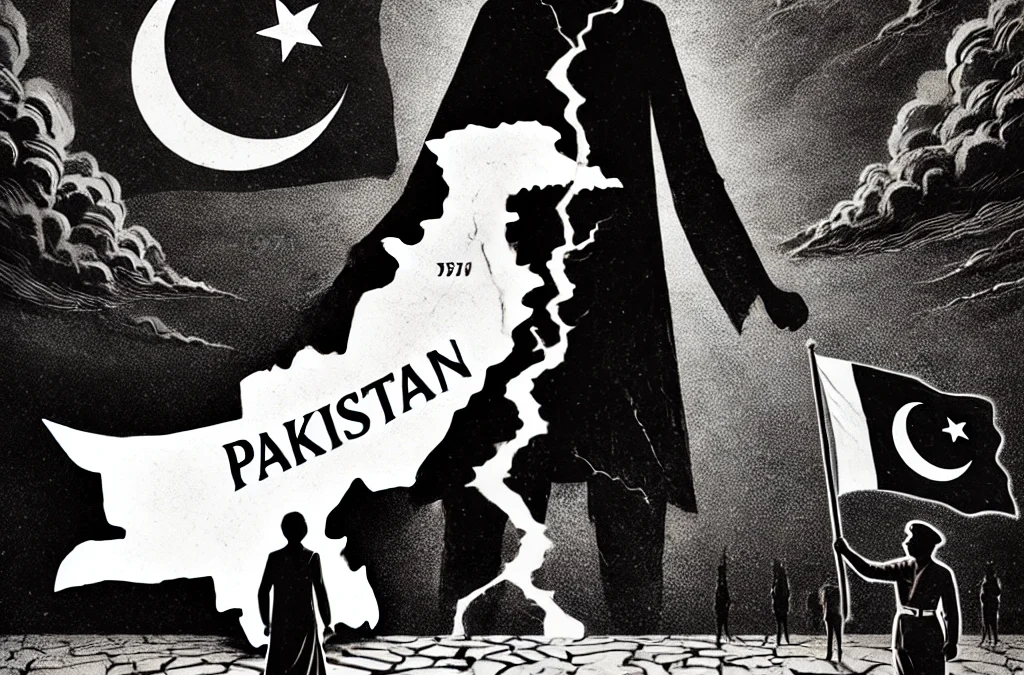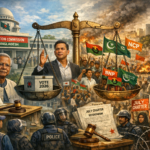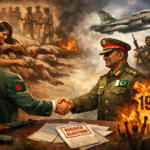Introduction
In recent years, there has been an unsettling push by certain groups for Bangladesh to reconcile with Pakistan and forget the harrowing events of 1971. These voices advocate for a reunion or, at the very least, an ideological alignment with Pakistan, often framing it as a step toward unity within the Muslim world. However, before delving into any idea of reconciliation, it is crucial to re-examine the traumatic History between the two countries. Bangladesh’s journey from East Pakistan to an independent nation is deeply scarred by 24 years of oppression, systemic marginalization, and, ultimately, genocide.
This article argues that any notion of “trust” or “forgiveness” toward Pakistan should be met with scepticism. The History of Pakistan’s violence and exploitation of Bangladesh, coupled with its consistent refusal to acknowledge its past wrongdoings, makes the idea of reconciliation not only premature but also a potential betrayal of the memory of millions who suffered and sacrificed for Bangladesh’s independence.
The History of Oppression and Suppression (1947-1971)
When the subcontinent was partitioned in 1947, East and West Pakistan were joined as one nation despite vast cultural, linguistic, and economic differences. The geographical, social, and political disparity between the two regions led to a relationship in which East Pakistan (now Bangladesh) was treated as a colony rather than an equal partner in the new state.
Economic Exploitation and Neglect
From the beginning, the central government in West Pakistan viewed East Pakistan as a resource to be exploited. Despite East Pakistan contributing a major share of Pakistan’s foreign exchange through the export of jute, the economic policies primarily benefited West Pakistan.
– Infrastructure in East Pakistan was neglected, and development funds were disproportionately allocated to West Pakistan. This created a severe imbalance, with East Pakistan left impoverished and marginalized, laying the groundwork for resentment and calls for autonomy.
Cultural and Linguistic Suppression
– The refusal to recognize Bengali as one of the official languages was a direct assault on the identity of East Pakistanis. In 1952, the Language Movement emerged as a pivotal moment, with students protesting the imposition of Urdu as the only national language. Pakistan’s response was brutal, with police firing upon students, leading to deaths that cemented the movement’s role in the growing resistance against West Pakistani control.
– Language and culture are core elements of identity, and by trying to erase Bengali, Pakistan attempted to strip East Pakistanis of their own heritage, forcing them into a homogenized identity that served the interests of West Pakistan alone.
Racial Annihilation and the 1971 Genocide
The culmination of these injustices occurred during the Liberation War of 1971, which exposed Pakistan’s deep-seated disregard and, indeed, hatred for the people of East Pakistan. The atrocities committed during this period remain one of the darkest chapters in modern History.
Operation Searchlight: The Beginning of Genocide
– On March 25, 1971, Pakistan launched Operation Searchlight, a military crackdown aimed at crushing the Bengali nationalist movement. What followed was a systematic campaign of mass murder, sexual violence, and destruction targeting Bengalis, particularly those from the Hindu minority.
– Reports suggest that up to three million people were killed, and hundreds of thousands of women were raped. The aim was not only to suppress dissent but to annihilate an entire identity that dared to assert its right to self-determination.
The Rape of Bangladeshi Women as a Weapon of War
– One of the most horrific aspects of the genocide was the widespread and systematic use of rape as a weapon of war. Pakistani soldiers brutally assaulted Bangladeshi women, leaving a legacy of trauma that has scarred the nation for generations.
– These acts of sexual violence were part of an orchestrated plan to terrorize, humiliate, and destroy the Bengali populace. To this day, survivors of these atrocities bear the scars, both physical and emotional, of Pakistan’s ruthless efforts to wipe out their identity.
Targeted Ethnic Cleansing of Bengali Hindus
– The genocide also included targeted attacks on the Hindu population, who were singled out for extermination due to their religion and ethnicity. This was a deliberate attempt to cleanse East Pakistan of its Hindu population, which further underscored the racial motivations behind the violence.
– Many Hindu families were either killed or forced to flee, with Pakistan’s military conducting door-to-door searches to locate and eliminate Hindus. This ethnic cleansing not only decimated the Hindu community but served as a grim reminder of Pakistan’s colonial and racist ideology toward East Pakistanis.
Pakistan’s Denial and the Absence of Accountability
Since the independence of Bangladesh, Pakistan has repeatedly refused to acknowledge its role in the genocide. No formal apology has been issued, and Pakistani leaders continue to downplay or outright deny the atrocities committed. This lack of accountability speaks volumes about Pakistan’s unwillingness to reconcile with its dark History.
No Apology, No Compensation
– Despite calls from international human rights organizations and Bangladesh itself, Pakistan has not offered any apology or compensation for the horrors inflicted upon the Bengali people. The refusal to apologize is more than an oversight; it is a direct insult to the memory of those who perished and suffered.
– Without acknowledgement, there can be no genuine reconciliation. An apology, reparations, or any meaningful gesture of remorse are necessary for healing. Pakistan’s consistent evasion and denial demonstrate its unwillingness to meet these basic accountability requirements.
Historical Revisionism and Propaganda
– Pakistani textbooks and state narratives have attempted to rewrite the events of 1971, portraying the Liberation War as an unfortunate outcome of Indian interference rather than a justified movement for independence. By shifting blame, Pakistan absolves itself of responsibility and perpetuates a distorted view of History.
– This historical revisionism is an extension of the same imperialistic mindset that led to the original oppression. Pakistan’s refusal to own up to its past actions remains an ongoing wound for Bangladesh.
The Myth of “Islamic Unity” and the Push for Reconciliation
In recent years, some Pakistani and Bangladeshi figures have advocated for unity under the “Islamic solidarity” banner, suggesting that bygones should be bygones. However, this argument needs to address the core issues that led to Bangladesh’s independence in the first place.
Islamic Solidarity Cannot Erase History
– While religious commonality may exist, it cannot override the experiences and suffering of Bangladeshis. Attempting to do so only trivializes the struggles faced by Bangladesh in its quest for independence and undermines the significance of national identity.
– Islamic unity, in this case, appears to be a convenient facade to mask unresolved tensions and Pakistan’s refusal to acknowledge its actions. True unity cannot exist when one party refuses to acknowledge its wrongdoings.
The Crocodile Tears of “Sympathizers
– Many so-called sympathizers from Pakistan have attempted to frame the separation of East and West Pakistan as a tragic loss, often shedding what appear to be crocodile tears over Bangladesh’s independence. This perspective reveals a condescending nostalgia that romanticizes the colonial relationship, ignoring the reality of oppression and violence that East Pakistan endured.
– Bangladesh does not need Pakistan’s pity or its calls for reunification. These calls are insincere gestures that fail to address the genuine History and grievances of the Bangladeshi people.
Why Bangladesh Should Not Forgive or Reconcile
The atrocities committed by Pakistan against Bangladesh were not mere historical “mistakes” or misunderstandings—they were acts of deliberate brutality rooted in a desire to dominate and suppress. Forgiving or reconciling with Pakistan without accountability would dishonour the memory of those who suffered and would undermine Bangladesh’s sovereignty and identity.
Protecting National Identity and Sovereignty
– Bangladesh’s hard-won independence is a testament to the resilience of its people and their right to self-determination. Trusting or reconciling with Pakistan could erode this sense of identity, risking a return to the era when Bengali culture, language, and identity were subjugated.
– National sovereignty must be safeguarded, and any attempts by Pakistan to undermine Bangladesh’s independence through calls for unity should be met with firm rejection.
Ensuring Justice for Past Atrocities
– Justice is a non-negotiable demand. Bangladesh must continue to press for formal recognition of the genocide, an apology, and reparations. Only then could any future discussions about forgiveness be entertained.
– Without justice, reconciliation is hollow. Pakistan must first face its own dark History before any meaningful dialogue can occur.
Conclusion
Bangladesh has no reason to trust Pakistan, a country that has shown neither remorse nor accountability for its role in the genocide and oppression of the Bangladeshi people. Calls for reconciliation or unity are not only premature but also disrespectful to the legacy of those who fought and died for Bangladesh’s independence.
In the face of Pakistan’s continued denial and its revisionist approach to History, Bangladesh must stand firm in its commitment to justice and its national identity. Any move toward reconciliation without accountability risks erasing the painful truths of the past and betraying the memory of millions who suffered. In the end, Bangladesh owes it to itself—and to future generations—to remember, resist, and reject any notion of forgiveness without justice.






